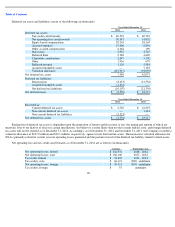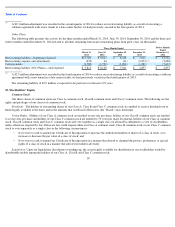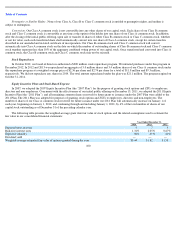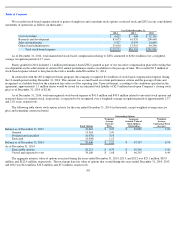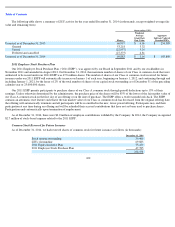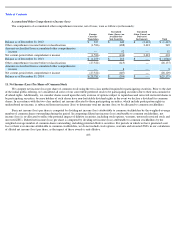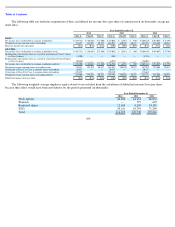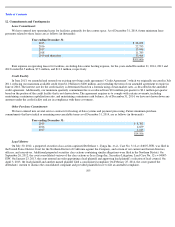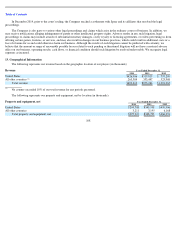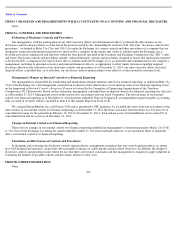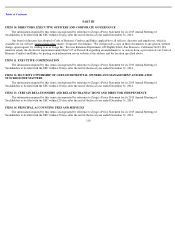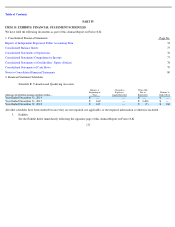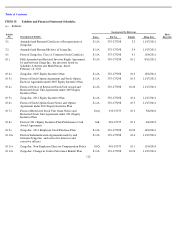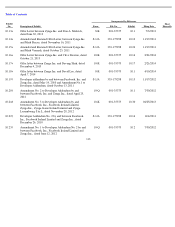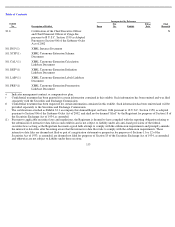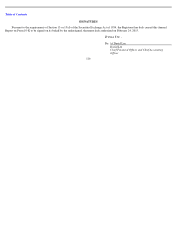Zynga 2014 Annual Report Download - page 109
Download and view the complete annual report
Please find page 109 of the 2014 Zynga annual report below. You can navigate through the pages in the report by either clicking on the pages listed below, or by using the keyword search tool below to find specific information within the annual report.
Table of Contents
The lead plaintiff filed a First Amended Complaint on March 31, 2014. The First Amended Complaint alleges that the defendants violated
the federal securities laws by issuing false or misleading statements regarding the Company’s business and financial projections. The plaintiffs
seek to represent a class of persons who purchased or otherwise acquired the Company’s securities between February 14, 2012 and July 25,
2012. The First Amended Complaint asserts claims for unspecified damages, and an award of costs and expenses to the putative class, including
attorneys’ fees. The Company filed a motion to dismiss the First Amended Complaint on May 2, 2014, and briefing on the motion was
completed in June 2014. On September 15, 2014, the court issued an order vacating the previously scheduled hearing and taking the motion
under submission.
In addition, a purported securities class action captioned Reyes v. Zynga Inc., et al. was filed on August 1, 2012, in San Francisco County
Superior Court. The action was removed to federal court, and was later remanded to San Francisco County Superior Court. The complaint
alleges that the defendants violated the federal securities laws by issuing false or misleading statements in connection with an April 2012
secondary offering of Class A common stock. The plaintiff seeks to represent a class of persons who acquired the Company’s common stock
pursuant or traceable to the secondary offering. On June 10, 2013, the defendants filed a motion to stay the action and a demurrer arguing that
the complaint should be dismissed because the court lacks jurisdiction over the claims. On August 26, 2013, the court issued orders overruling
the demurrer and granting the motion to stay all deadlines in the action pending a ruling on the motion to dismiss in the federal securities class
action described above. On September 29, 2014, the court issued orders denying a motion to continue the stay of the action and overruling a
demurrer arguing that the complaint failed to state a cause of action. On October 15, 2014, the defendants filed a petition in the California Court
of Appeal seeking review of the denial of the motion to stay and of the trial court’s ruling that it had jurisdiction to hear the claims. On
January 29, 2015, the Court of Appeal denied defendants’ petition. On February 11, 2015, the court granted plaintiff’s request for voluntary
dismissal of the action with prejudice as to the named plaintiff’s claims and without prejudice as to the claims of any other members of the
proposed class.
On April 4, 2013, a purported class action captioned Lee v. Pincus, et al. was filed in the Court of Chancery of the State of Delaware
against the Company, and certain of our current and former directors, officers, and executives. The complaint alleges that the defendants
breached fiduciary duties in connection with the release of certain lock-up agreements entered into in connection with the Company’s initial
public offering. The plaintiff seeks to represent a class of certain of the Company’s shareholders who were subject to the lock-
up agreements and
who were not permitted to sell shares in an April 2012 secondary offering. On January 17, 2014, the plaintiff filed an amended complaint. On
March 6, 2014, the defendants filed motions to dismiss the amended complaint and a motion to stay discovery while the motions to dismiss were
pending. On November 14, 2014, the court denied the motion to dismiss brought by Zynga and the directors and granted the motion to dismiss
brought by the underwriters who had been named as defendants.
Although it is reasonably possible that our assessment of the possibility of loss could change in the near term due to one or more
confirming events, the Company believes it has meritorious defenses in the above securities class actions and will vigorously defend these
actions. Furthermore, given that we are in the early stages of the litigation process, we are unable to estimate the range of potential loss, if any.
Since August 3, 2012, nine stockholder derivative lawsuits have been filed in State or Federal courts in California and Delaware
purportedly on behalf of the Company against certain current and former directors and executive officers of the Company. The derivative
plaintiffs allege that the defendants breached their fiduciary duties and violated California Corporations Code section 25402 in connection with
our initial public offering in December 2011, secondary offering in April 2012, and allegedly made false or misleading statements regarding the
Company’s business and financial projections.
Beginning on August 3, 2012, three of the actions were filed in San Francisco County Superior Court. On October 2, 2012, the court
consolidated those three actions as In re Zynga Shareholder Derivative Litigation, Lead Case CGC-12-
522934. On March 14, 2013, the plaintiffs
filed a First Amended Complaint in that
106


